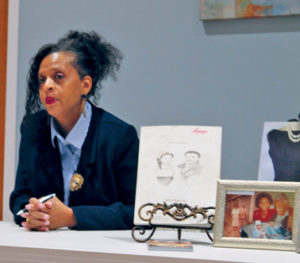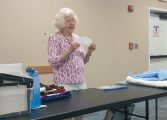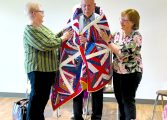By Page H. Gifford, Correspondent
During a talk on genealogy, Leontyne Clay Peck told residents of Lake Monticello Wednesday evening (May 30) about her genealogical journey, beginning with her father.
“I asked him about his relatives, and all he ever told me was ‘they’re all dead.’ ” Her pathway to her heritage began with other small steps. “In fourth grade we w ere learning about slavery and Henry Clay was mentioned. I asked my teacher if I could be related. She told me no but then I asked her could he have owned my people, and she said possibly.” Later discoveries would give her some amazing answers to these earlier questions. But for a while these questions floated around in her mind until years later when she would finally act on them.
ere learning about slavery and Henry Clay was mentioned. I asked my teacher if I could be related. She told me no but then I asked her could he have owned my people, and she said possibly.” Later discoveries would give her some amazing answers to these earlier questions. But for a while these questions floated around in her mind until years later when she would finally act on them.
After her first child was born, Peck’s grandmother Laura visited, and they talked. During their conversation Peck asked about the family and Laura was more forthcoming with information and told Peck about her paternal grandparents, Amanda and Washington Clay. This stuck with her and was the
first tangible piece of information she had received from a family member.Originally from Piedmont, West Virginia, Peck and her husband had made their way to Charlottesville and later Lake Monticello. She worked in Community and Economic Development and liked the area but had no idea she was closer than she thought to her family roots. It was after her grandmother Laura died and she was working on her obituary and discovered that Laura and her husband were from Madison County. Curious, she had her husband drove to Madison. The county clerk was very obliging and helped her locate the Clay family records.
“Madison County had a lot of free blacks, this was because there were not a lot of plantations but mostly farms owned by Germans who might have had one or two slaves or none at all.” Once she located the family records, Peck got hooked on genealogy and writing.
She started her journey in Criglersville, Virginia, where her father grew up and found the church he had attended as a child. She then attended an African-American festival at Piedmont Virginia Community College and found the African-American Genealogical Society of Charlottesville and spoke with Julian Burke, who was an expert and helped guide her further in her search.
She used Ancestry.com and 23andMe but preferred Ancestry for the bulk of her research.
“I then went to a meeting of the Clay Family Society and was the only person of color in the room,” she laughed. “I then became more addicted and more involved as time went on and joined other genealogy groups.” After extensive research, her brother did a DNA test but it didn’t match. Peck pointed out that the male line may not be the only line and it can be traced through the female line, though it is just more complex. She added that DNA over centuries can be watered down so it may not always prove there isn’t a link and that is why records are so essential. Eventually, she discovered that through the Mitchell Clay line she was a distant cousin of Henry Clay’s. The audience delighted in the irony, recalling her fourth-grade teacher’s answer to her question.
“I found another link to politician and abolitionist Cassius Marcellus Clay who Mohammad Ali was also related to but I am not related Mohammad Ali.”
Her first book Silver Children is the family history of Henry and Judy Clay of Madison County, Virginia. In the book she features detailed documents and records along with photos. Her second book Our Mother’s Dresses is about her journey finding her female ancestors who were African, European
and American through DNA. Her current book, Paxton Street is a memoir and through vignettes she tells the story of living in Piedmont, West Virginia, where she says, “Everyone was segregated by choice and got along together.”
“Through this research I had made connections with other long-lost cousins.” Her father was ill and didn’t have much time left but for her father’s sake she was determined to find his relatives and her journey then led her to Elmo Clay. “When I finally located Elmo, I asked him ‘are you Elmo Clay’ and he replied, ‘It depends, are you the law?” This made her wonder. She explained her visit to Elmo and herecalled going to church when he was a child with her father. “They had all gone their separate ways and lost contact.”
Later, she got a phone call from Elmo’s sister Emma, who also had been looking for relations. Emma said her father told her the same thing — everyone died. She told her father about Elmo and Emma and her father also recalled knowing Elmo as a child. Eventually, she brought them all together in West Virginia for a family reunion for what she thought was going to be the first and last for her father, since time seem to be running out for him.
“My father was supposed to be at death’s door but he lived another seven years.”
Through her journey she found some scandals and some heroes and through her relatives she saw life through their eyes and their interactions. But she admits she never found any slaves and from what she found, they were free men, again disproving what her fourth grade teacher had told her.
“It was emotional and fun,” she said. “You don’t tell the stories for yourself but for the next generations. We tell the ancestry stories; they are who we are.”
For more information about genealogical research, visit Leontyne Clay Peck at https://www.leontynepeck.com/leontyne-clay-peck and




